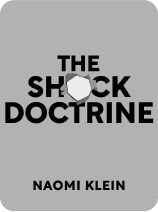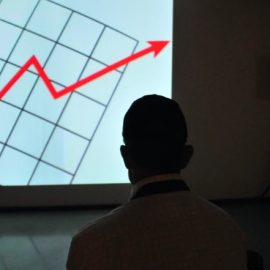

This article is an excerpt from the Shortform book guide to "The Shock Doctrine" by Naomi Klein. Shortform has the world's best summaries and analyses of books you should be reading.
Like this article? Sign up for a free trial here .
Are you looking for The Shock Doctrine quotes by Naomi Klein? What are some of the most noteworthy passages worth revisiting?
The Shock Doctrine discusses how economic shock therapy gave rise to “the disaster capitalism complex”—a privatized system of destruction and economic reconstruction. Klein argues this economic plan doesn’t improve an economy, as its proponents claim. Instead, it invariably leads to mass unemployment, increased poverty, and widespread starvation, while a few select people become extremely rich.
Here is a selection of The Shock Doctrine quotes with explanations.
The Shock Doctrine: The Rise of Disaster Capitalism
The Shock Doctrine: The Rise of Disaster Capitalism by Naomi Klein, is a study of the history of economic shock therapy, which is a method of (supposedly) boosting a country’s economy through rapid deregulation, privatization, and severe cuts to government spending.
The following The Shock Doctrine quotes highlight some of the key ideas.
“The dirty secret of the neoliberal era is that these ideas were never defeated in a great battle of ideas, nor were they voted down in elections. They were shocked out of the way at key political junctures.”
According to Klein, neoliberal economics has never been welcomed by the majority. Neoliberal policies were instituted during times of political shocks when people were too bewildered to really understand their long-term consequences.
“It was in 1982 that Milton Friedman wrote the highly influential passage that best summarizes the shock doctrine. ” Only a crisis-actual or percieved-produces real change. When the crisis occurs, the actions that are taken depend on the ideas that are lying around. That, I believe, is our basic function: to develop alternatives to existing policies, to keep them alive and available until the politically impossible becomes politically inevitable.”
Milton Friedman noticed that people and governments are more receptive to dramatic economic policy changes after a crisis, which allowed an opening for his theories to be adopted. This formed the basis for Milton’s Crisis Theory: In simple terms, it meant leveraging a political or economic crisis to win public support, rather than pushing through the neoliberal agenda with brute force.
The Crisis Theory was necessary because, although free-market economics spread quickly and brutally through South America, it had a harder time gaining traction in the US and Britain where democracy was more deeply entrenched, because people weren’t voting for politicians who tried to implement Friedman’s policies.
British prime minister Margaret Thatcher demonstrated how the Crisis Theory could advance Friedman’s policies during the Falklands War of 1982. It was an 11-week struggle between Britain and Argentina for control of the Falkland Islands which gave Britain an outside enemy. The people were swept away by a wave of nationalism and militarism, and they eagerly fell in line behind prime minister Margaret Thatcher. Her approval rating rocketed up from 25% to nearly 60%. Thatcher used her newfound popularity to impose neoliberal economic policies and government repression on a level that she’d told the Chicago School was impossible; for example, using police and government surveillance to squash a coal miners’ strike.
“From Chile to China to Iraq, torture has been a silent partner in the global free-market crusade.”
Torture was instrumental in bringing free-market capitalism to countries around the world. Naturally, Milton Friedman and his colleagues were all too happy to take credit for the economic “miracles” happening in Chile and elsewhere. However, they denied any connection between their economic theories and the brutal repression happening in those countries.
Friedman said that he disagreed strongly with the new totalitarian government of Chile, but nonetheless saw nothing wrong with offering economic advice to Pinochet’s government. He condemned the electric shock treatments happening in prisons, but still applauded the economic shock treatments happening to the countries.

———End of Preview———
Like what you just read? Read the rest of the world's best book summary and analysis of Naomi Klein's "The Shock Doctrine" at Shortform .
Here's what you'll find in our full The Shock Doctrine summary :
- A study of the history of economic shock therapy
- How economic shock therapy gave rise to the disaster capitalism complex
- How communities are beginning to recover from the destructive shock treatments






